Fleurs du Mal Magazine


Or see the index
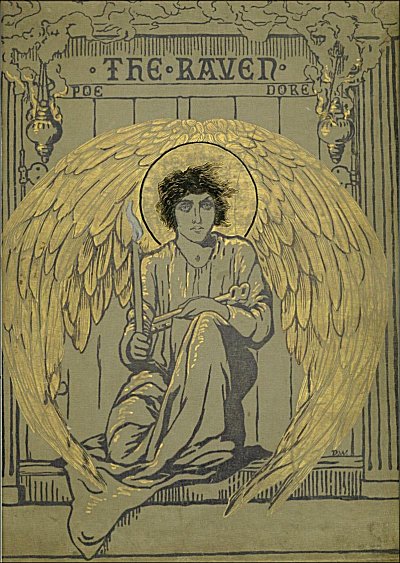
Edgar Allan Poe
(1809-1849)
& Gustave Doré
(1832-1883)
T H E R A V E N
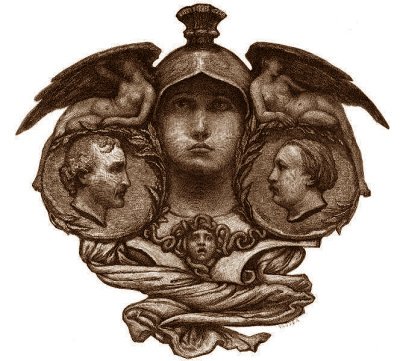

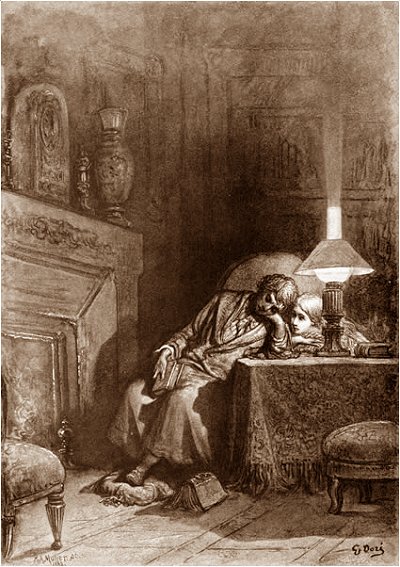

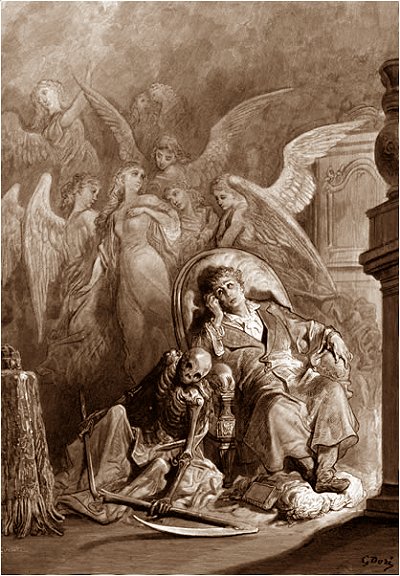
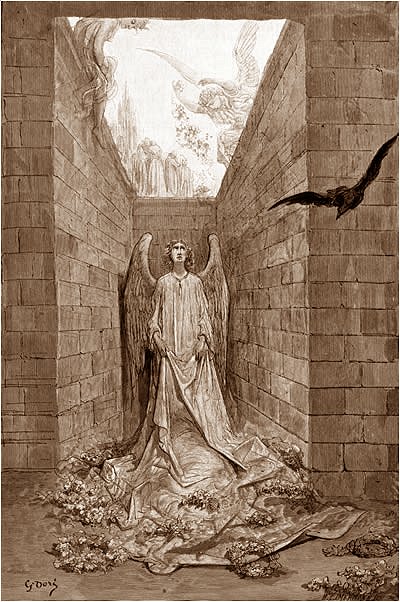
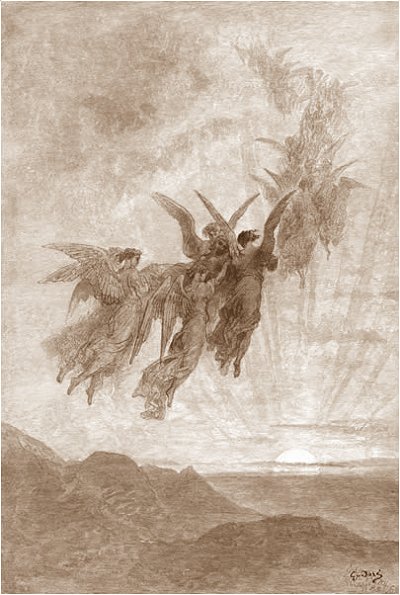
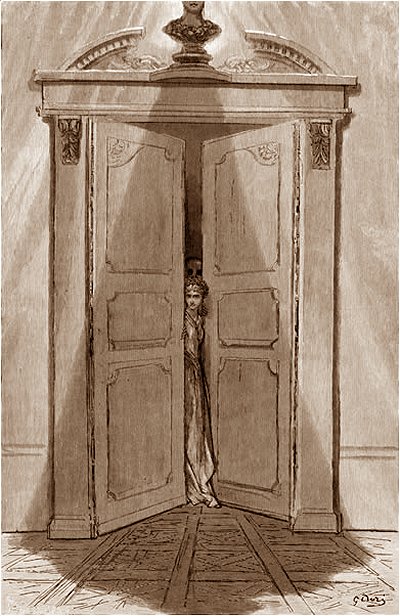
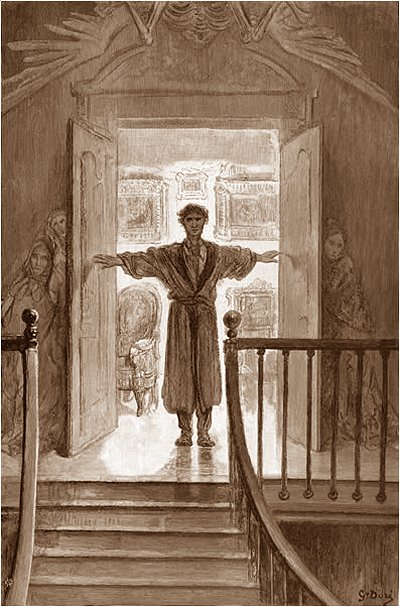
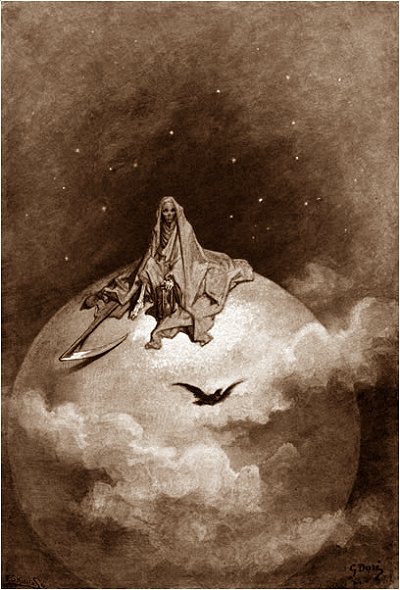
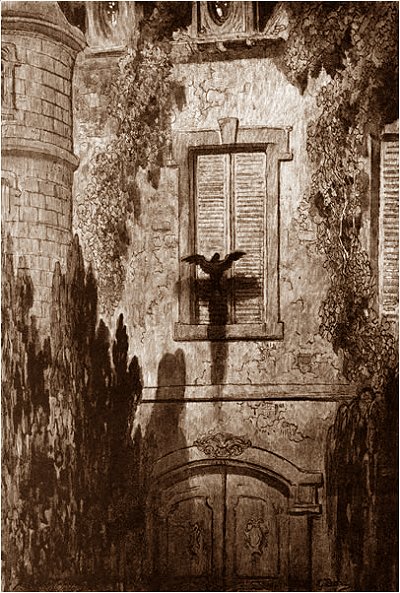
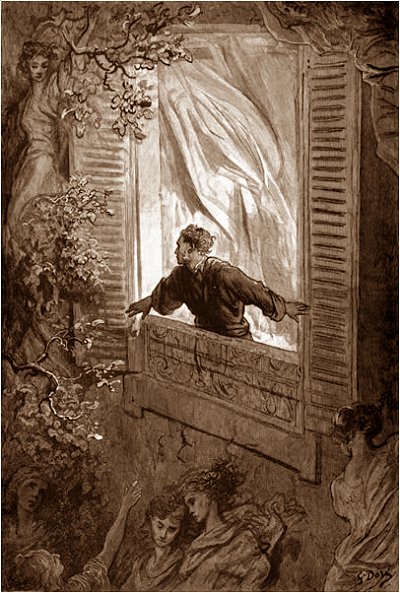
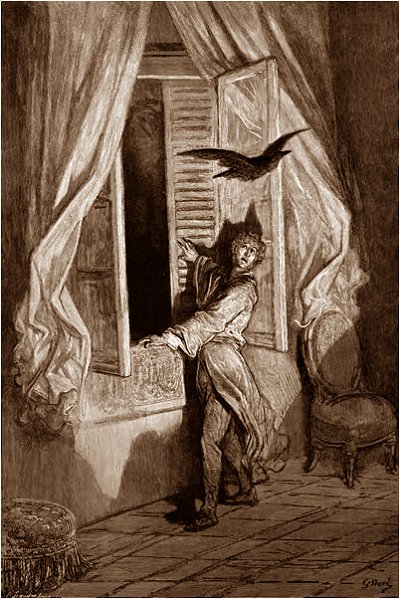
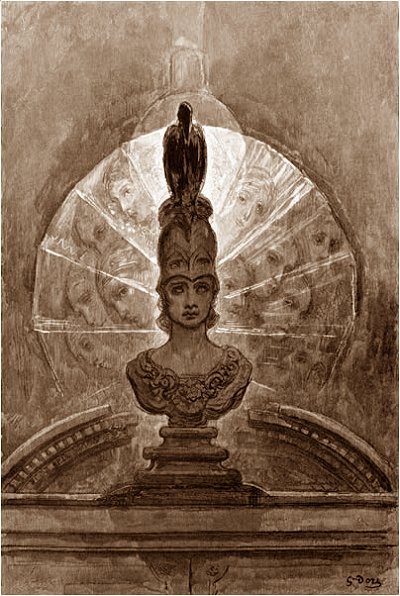
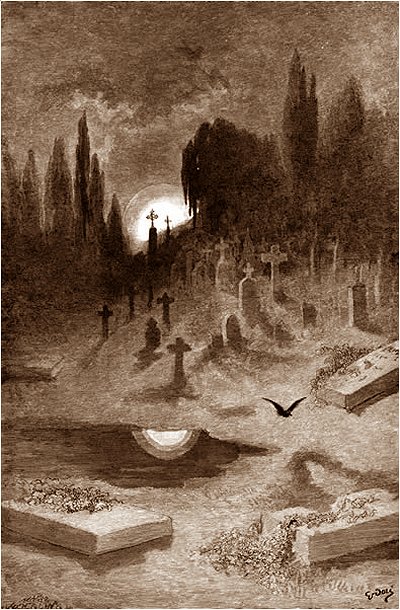
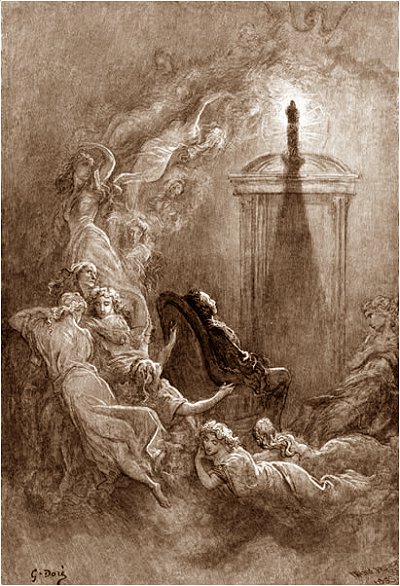
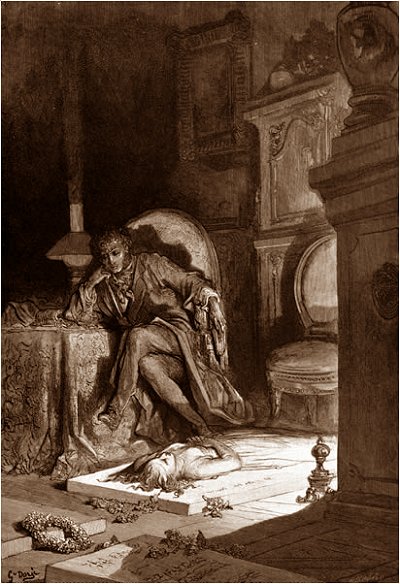

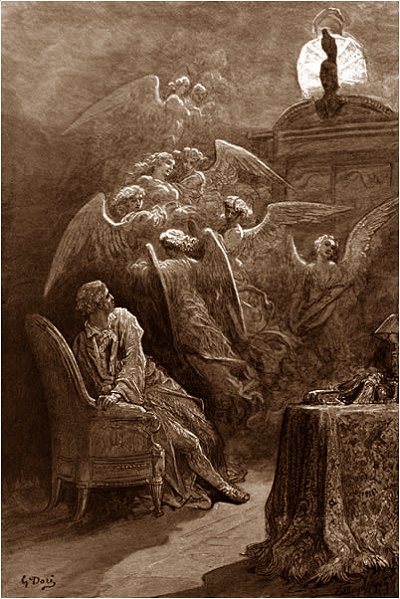
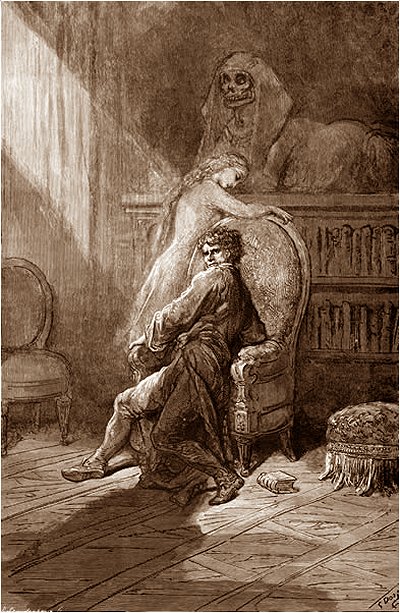
Edgar Allan Poe & Gustave Doré:
The Raven – part I
kempis poetry magazine
More in: Department of Ravens & Crows, Poe, Edgar Allan
.jpg)
E D G A R A L L A N P O E
(1809-1849)
Six Poems
The Assignation
Thou wast all that to me, love,
For which my soul did pine-
A green isle in the sea, love,
A fountain and a shrine,
All wreathed with fairy fruits and flowers,
And all the flowers were mine.
Ah, dream too bright to last!
Ah, starry Hope! that didst arise
But to be overcast!
A voice from out the Future cries,
"Onward!"- but o’er the Past
(Dim gulf!) my spirit hovering lies
Mute, motionless, aghast!
For, alas! alas! with me
The light of life is o’er!
"No more– no more– no more,"
(Such language holds the solemn sea
To the sands upon the shore)
Shall bloom the thunder-blasted tree
Or the stricken eagle soar!
And all my hours are trances,
And all my nightly dreams
Are where thy dark eye glances,
And where thy footstep gleams-
In what ethereal dances,
By what Italian streams.
Alas! for that accursed time
They bore thee o’er the billow,
From Love to titled age and crime,
And an unholy pillow!–
From me, and from our misty clime,
Where weeps the silver willow!

Alone
From childhood’s hour I have not been
As others were; I have not seen
As others saw; I could not bring
My passions from a common spring.
From the same source I have not taken
My sorrow; I could not awaken
My heart to joy at the same tone;
And all I loved, I loved alone.
Then- in my childhood, in the dawn
Of a most stormy life- was drawn
From every depth of good and ill
The mystery which binds me still:
From the torrent, or the fountain,
From the red cliff of the mountain,
From the sun that round me rolled
In its autumn tint of gold,
From the lightning in the sky
As it passed me flying by,
From the thunder and the storm,
And the cloud that took the form
(When the rest of Heaven was blue)
Of a demon in my view.
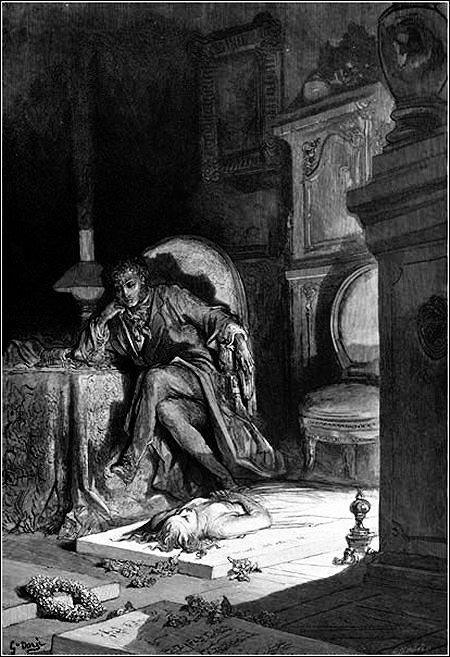
The Haunted Palace
In the greenest of our valleys
By good angels tenanted,
Once a fair and stately palace —
Snow-white palace — reared its head.
In the monarch thought’s dominion —
It stood there!
Never Seraph spread his pinion
Over fabric half so fair.
Banners yellow, glorious, golden,
On its roof did float and flow —
This — all this — was in the olden
Time long ago —
And every gentle air that dallied,
In that sweet day,
Along the rampart plumed and pallid,
A winged odour went away.
All wanderers in that happy valley,
Through two luminous windows saw
Spirits moving musically
To a lute’s well tuned law,
Round about a throne where sitting
(Porphyrogene!)
In state his glory well befitting,
The sovereign of the realm was seen.
And all with pearl and ruby glowing
Was the fair palace door ;
Through which came flowing, flowing, flowing,
And sparkling evermore,
A troop of echoes, whose sweet duty
Was but to sing
In voices of surpassing beauty,
The wit and wisdom of their king.
But evil things in robes of sorrow,
Assailed the monarch’s high estate!
Ah, let us mourn — for never morrow
Shall dawn upon him desolate!
And round about his home the glory,
That blushed and bloomed,
Is but a dim-remembered story
Of the old time entombed.
And travellers now within that valley,
Through the red-litten windows, see
Vast forms that move fantastically
To a discordant melody;
While, like a rapid ghastly river,
Through the pale door;
A hideous throng rush out forever,
And laugh — but smile no more.

The Valley of Unrest
Once it smiled a silent dell
Where the people did not dwell;
They had gone unto the wars,
Trusting to the mild-eyed stars,
Nightly, from their azure towers,
To keep watch above the flowers,
In the midst of which all day
The red sunlight lazily lay.
Now each visitor shall confess
The sad valley’s restlessness.
Nothing there is motionless-
Nothing save the airs that brood
Over the magic solitude.
Ah, by no wind are stirred those trees
That palpitate like the chill seas
Around the misty Hebrides!
Ah, by no wind those clouds are driven
That rustle through the unquiet Heaven
Uneasily, from morn till even,
Over the violets there that lie
In myriad types of the human eye-
Over the lilies there that wave
And weep above a nameless grave!
They wave: — from out their fragrant tops
Eternal dews come down in drops.
They weep: — from off their delicate stems
Perennial tears descend in gems.
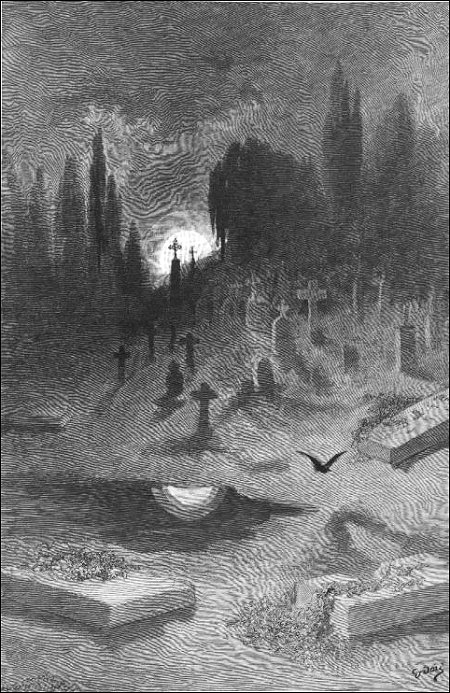
The Valley Nis
Far away — far away —
Far away — as far at least
Lies that valley as the day
Down within the golden east —
All things lovely — are not they
Far away — far away ?
It is called the valley Nis.
And a Syriac tale there is
Thereabout which Time hath said
Shall not be interpreted.
Something about Satan’s dart —
Something about angel wings —
Much about a broken heart —
All about unhappy things:
But "the valley Nis" at best
Means "the valley of unrest."
Once it smil’d a silent dell
Where the people did not dwell,
Having gone unto the wars —
And the sly, mysterious stars,
With a visage full of meaning,
O’er the unguarded flowers were leaning:
Or the sun ray dripp’d all red
Thro’ the tulips overhead,
Then grew paler as it fell
On the quiet Asphodel.
Now the unhappy shall confess
Nothing there is motionless:
Helen, like thy human eye
There th’ uneasy violets lie —
There the reedy grass doth wave
Over the old forgotten grave —
One by one from the tree top
There the eternal dews do drop —
There the vague and dreamy trees
Do roll like seas in northern breeze
Around the stormy Hebrides —
There the gorgeous clouds do fly,
Rustling everlastingly,
Through the terror-stricken sky,
Rolling like a waterfall
O’er th’ horizon’s fiery wall —
There the moon doth shine by night
With a most unsteady light —
There the sun doth reel by day
"Over the hills and far away."
.jpg)
Evening Star
‘Twas noontide of summer,
And mid-time of night;
And stars, in their orbits,
Shone pale, thro’ the light
Of the brighter, cold moon,
‘Mid planets her slaves,
Herself in the Heavens,
Her beam on the waves.
I gazed awhile
On her cold smile;
Too cold— too cold for me—
There pass’d, as a shroud,
A fleecy cloud,
And I turned away to thee,
Proud Evening Star,
In thy glory afar,
And dearer thy beam shall be;
For joy to my heart
Is the proud part
Thou bearest in Heaven at night,
And more I admire
Thy distant fire,
Than that colder, lowly light.
The End
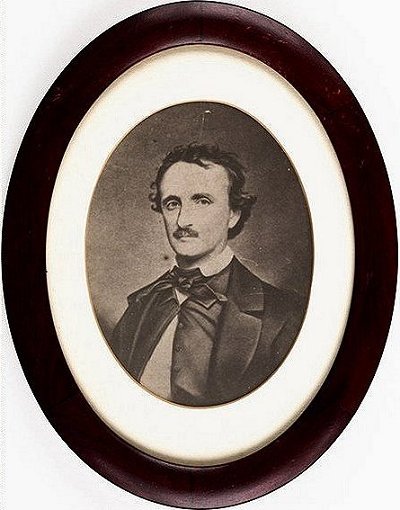
Edgar Allan Poe: Six Poems
KEMP=MAG poetry magazine – magazine for art & literature
More in: Edgar Allan Poe, Poe, Edgar Allan
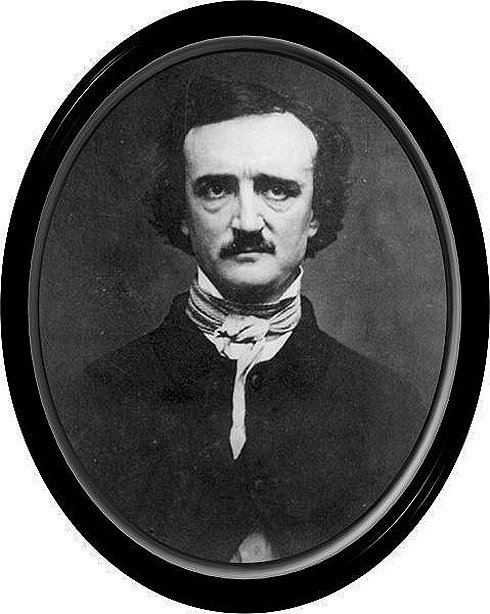
EDGAR ALLAN POE
(1809-1849)
Bicentennial of Poe’s birthday
on January 19, 1809
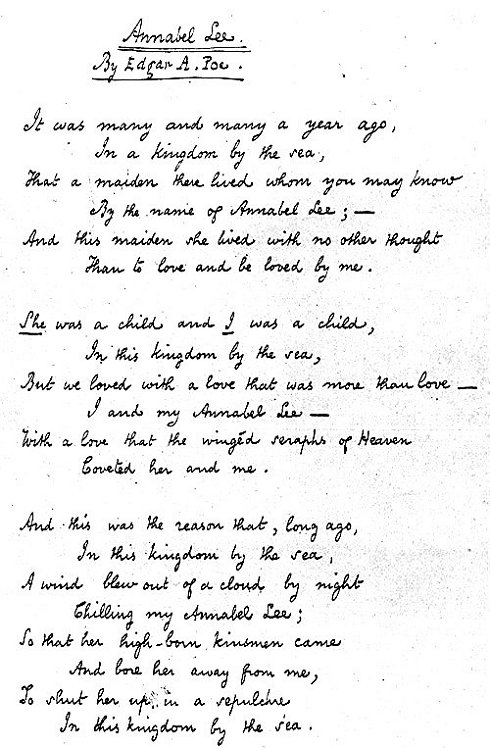
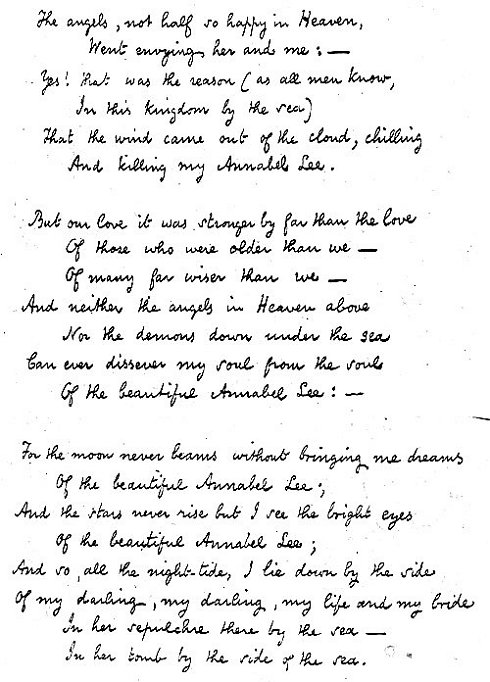
Annabel Lee
by E. A. Poe
It was many and many a year ago,
In a kingdom by the sea,
That a maiden there lived whom you may know
By the name of Annabel Lee;
And this maiden she lived with no other thought
Than to love and be loved by me.
I was a child and she was a child,
In this kingdom by the sea;
But we loved with a love that was more than love-
I and my Annabel Lee;
With a love that the winged seraphs of heaven
Coveted her and me.
And this was the reason that, long ago,
In this kingdom by the sea,
A wind blew out of a cloud, chilling
My beautiful Annabel Lee;
So that her highborn kinsman came
And bore her away from me,
To shut her up in a sepulchre
In this kingdom by the sea.
The angels, not half so happy in heaven,
Went envying her and me-
Yes!- that was the reason (as all men know,
In this kingdom by the sea)
That the wind came out of the cloud by night,
Chilling and killing my Annabel Lee.
But our love it was stronger by far than the love
Of those who were older than we-
Of many far wiser than we-
And neither the angels in heaven above,
Nor the demons down under the sea,
Can ever dissever my soul from the soul
Of the beautiful Annabel Lee.
For the moon never beams without bringing me dreams
Of the beautiful Annabel Lee;
And the stars never rise but I feel the bright eyes
Of the beautiful Annabel Lee;
And so, all the night-tide, I lie down by the side
Of my darling- my darling- my life and my bride,
In the sepulchre there by the sea,
In her tomb by the sounding sea.
.jpg)
200th Birthday of Edgar Allan Poe 1809-2009
born in Boston U.S.A. – January 19, 1809
KEMP=MAG poetry magazine – magazine for art & literature
More in: Edgar Allan Poe, Poe, Edgar Allan

EDGAR ALLAN POE poetry
Spirits Of The Dead
1
Thy soul shall find itself alone
‘Mid dark thoughts of the grey tomb-stone-
Not one, of all the crowd, to pry
Into thine hour of secrecy:
2
Be silent in that solitude,
Which is not loneliness- for then
The spirits of the dead, who stood
In life before thee, are again
In death around thee, and their will
Shall overshadow thee; be still.
3
The night, tho’ clear- shall frown-
And the stars shall not look down,
From their high thrones in the heaven
With light like Hope to mortals given-
But their red orbs, without beam,
To thy weariness shall seem
As a burning and a fever
Which would cling to thee for ever.
4
Now are thoughts thou shalt not banish-
Now are visions ne’er to vanish-
From thy spirit shall they pass
No more- like dew-drop from the grass.
5
The breeze, the breath of God, is still,
And the mist upon the hill
Shadowy – shadowy – yet unbroken,
Is a symbol and a token-
How it hangs upon the trees,
A mystery of mysteries! –
Edgar Allan Poe
(1809-1849)
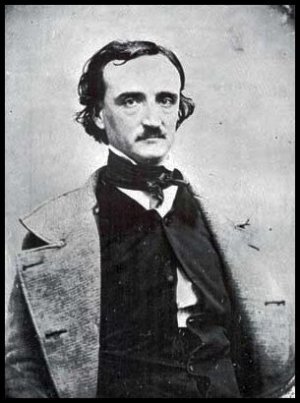
THE RAVEN
Once upon a midnight dreary, while I pondered, weak and weary,
Over many a quaint and curious volume of forgotten lore–
While I nodded, nearly napping, suddenly there came a tapping,
As of some one gently rapping–rapping at my chamber door.
"’Tis some visitor," I muttered, "tapping at my chamber door–
Only this and nothing more."
Ah, distinctly I remember, it was in the bleak December,
And each separate dying ember wrought its ghost upon the floor.
Eagerly I wished the morrow;–vainly I had sought to borrow
From my books surcease of sorrow–sorrow for the lost Lenore–
For the rare and radiant maiden whom the angels name Lenore–
Nameless here for evermore.
And the silken sad uncertain rustling of each purple curtain
Thrilled me–filled me with fantastic terrors never felt before;
So that now, to still the beating of my heart, I stood repeating
"’Tis some visitor entreating entrance at my chamber door–
Some late visitor entreating entrance at my chamber door;–
This it is and nothing more."
Presently my soul grew stronger; hesitating then no longer,
"Sir," said I, "or Madam, truly your forgiveness I implore;
But the fact is I was napping, and so gently you came rapping,
And so faintly you came tapping–tapping at my chamber door,
That I scarce was sure I heard you"–here I opened wide the door:–
Darkness there and nothing more.
Deep into that darkness peering, long I stood there wondering,
fearing,
Doubting, dreaming dreams no mortal ever dared to dream before;
But the silence was unbroken, and the darkness gave no token,
And the only word there spoken was the whispered word, "Lenore!"
This I whispered, and an echo murmured back the word, "Lenore!"
Merely this and nothing more.
Back into the chamber turning, all my soul within me burning,
Soon I heard again a tapping, somewhat louder than before.
"Surely," said I, "surely that is something at my window lattice;
Let me see, then, what thereat is, and this mystery explore–
Let my heart be still a moment, and this mystery explore;–
‘Tis the wind and nothing more."
Open here I flung the shutter, when, with many a flirt and flutter,
In there stepped a stately Raven of the saintly days of yore;
Not the least obeisance made he: not an instant stopped or stayed he;
But, with mien of lord or lady, perched above my chamber door–
Perched upon a bust of Pallas just above my chamber door–
Perched, and sat, and nothing more.
Then this ebony bird beguiling my sad fancy into smiling,
By the grave and stern decorum of the countenance it wore,
"Though thy crest be shorn and shaven, thou," I said, "art sure no
craven,
Ghastly grim and ancient Raven wandering from the Nightly shore–
Tell me what thy lordly name is on the Night’s Plutonian shore!"
Quoth the Raven, "Nevermore."
Much I marvelled this ungainly fowl to hear discourse so plainly,
Though its answer little meaning–little relevancy bore;
For we cannot help agreeing that no living human being
Ever yet was blessed with seeing bird above his chamber door–
Bird or beast upon the sculptured bust above his chamber door,
With such name as "Nevermore."
But the Raven, sitting lonely on that placid bust, spoke only
That one word, as if his soul in that one word he did outpour.
Nothing further then he uttered–not a feather then he fluttered–
Till I scarcely more than muttered, "Other friends have flown before–
On the morrow he will leave me, as my hopes have flown before."
Then the bird said, "Nevermore."
Startled at the stillness broken by reply so aptly spoken,
"Doubtless," said I, "what it utters is its only stock and store,
Caught from some unhappy master whom unmerciful Disaster
Followed fast and followed faster till his songs one burden bore–
Till the dirges of his Hope the melancholy burden bore
Of ‘Never–nevermore.’"
But the Raven still beguiling all my sad soul into smiling,
Straight I wheeled a cushioned seat in front of bird and bust and
door;
Then, upon the velvet sinking, I betook myself to linking
Fancy unto fancy, thinking what this ominous bird of yore–
What this grim, ungainly, ghastly, gaunt, and ominous bird of yore
Meant in croaking "Nevermore."
This I sat engaged in guessing, but no syllable expressing
To the fowl whose fiery eyes now burned into my bosom’s core;
This and more I sat divining, with my head at ease reclining
On the cushion’s velvet lining that the lamp-light gloated o’er,
But whose velvet violet lining with the lamp-light gloating o’er,
She shall press, ah, nevermore!
Then, methought, the air grew denser, perfumed from an unseen censer
Swung by Seraphim whose foot-falls tinkled on the tufted floor.
"Wretch," I cried, "thy God hath lent thee–by these angels he hath
sent thee
Respite–respite aad nepenthe from thy memories of Lenore!
Quaff, oh quaff this kind nepenthe, and forget this lost Lenore!"
Quoth the Raven, "Nevermore."
"Prophet!" said I, "thing of evil!–prophet still, if bird or devil!–
Whether Tempter sent, or whether tempest tossed thee here ashore,
Desolate yet all undaunted, on this desert land enchanted–
On this home by Horror haunted–tell me truly, I implore–
Is there– is there balm in Gilead?–tell me–tell me, I implore!"
Quoth the Raven, "Nevermore."
"Prophet!" said I, "thing of evil!–prophet still, if bird or devil!
By that Heaven that bends above us–by that God we both adore–
Tell this soul with sorrow laden if, within the distant Aidenn,
It shall clasp a sainted maiden whom the angels name Lenore–
Clasp a rare and radiant maiden whom the angels name Lenore."
Quoth the Raven, "Nevermore."
"Be that word our sign of parting, bird or fiend!" I shrieked,
upstarting–
"Get thee back into the tempest and the Night’s Plutonian shore!
Leave no black plume as a token of that lie thy soul hath spoken!
Leave my loneliness unbroken!–quit the bust above my door!
Take thy beak from out my heart, and take thy form from off my door!"
Quoth the Raven, "Nevermore."
And the Raven, never flitting, still is sitting, still is sitting
On the pallid bust of Pallas just above my chamber door;
And his eyes have all the seeming of a demon’s that is dreaming,
And the lamp-light o’er him streaming throws his shadow on the floor;
And my soul from out that shadow that lies floating on the floor
Shall be lifted–nevermore!
1845
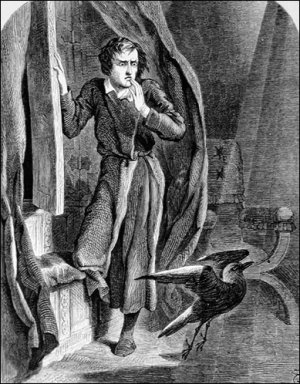
THE BELLS
I
Hear the sledges with the bells–
Silver bells!
What a world of merriment their melody foretells!
How they tinkle, tinkle, tinkle,
In their icy air of night!
While the stars, that oversprinkle All the heavens, seem to twinkle
With a crystalline delight;
Keeping time, time, time,
In a sort of Runic rhyme,
To the tintinnabulation that so musically wells
From the bells, bells, bells, bells,
Bells, bells, bells–
From the jingling and the tinkling of the bells.
II
Hear the mellow wedding bells, Golden bells!
What a world of happiness their harmony foretells!
Through the balmy air of night
How they ring out their delight!
From the molten golden-notes,
And all in tune,
What a liquid ditty floats
To the turtle-dove that listens, while she gloats
On the moon!
Oh, from out the sounding cells,
What a gush of euphony voluminously wells!
How it swells!
How it dwells
On the future! how it tells
Of the rapture that impels
To the swinging and the ringing
Of the bells, bells, bells,
Of the bells, bells, bells, bells,
Bells, bells, bells–
To the rhyming and the chiming of the bells!
III
Hear the loud alarum bells–
Brazen bells!
What a tale of terror now their turbulency tells!
In the startled ear of night
How they scream out their affright!
Too much horrified to speak,
They can only shriek, shriek,
Out of tune,
In a clamorous appealing to the mercy of the fire,
In a mad expostulation with the deaf and frantic fire
Leaping higher, higher, higher,
With a desperate desire,
And a resolute endeavor
Now–now to sit or never,
By the side of the pale-faced moon.
Oh, the bells, bells, bells!
What a tale their terror tells
Of Despair!
How they clang, and clash, and roar!
What a horror they outpour
On the bosom of the palpitating air!
Yet the ear it fully knows,
By the twanging,
And the clanging,
How the danger ebbs and flows;
Yet the ear distinctly tells,
In the jangling,
And the wrangling,
How the danger sinks and swells,
By the sinking or the swelling in the anger of the bells–
Of the bells–
Of the bells, bells, bells, bells,
Bells, bells, bells–
In the clamor and the clangor of the bells!
IV
Hear the tolling of the bells–
Iron bells!
What a world of solemn thought their monody compels!
In the silence of the night,
How we shiver with affright
At the melancholy menace of their tone!
For every sound that floats
From the rust within their throats
Is a groan.
And the people–ah, the people–
They that dwell up in the steeple.
All alone,
And who tolling, tolling, tolling,
In that muffled monotone,
Feel a glory in so rolling
On the human heart a stone–
They are neither man nor woman–
They are neither brute nor human–
They are Ghouls:
And their king it is who tolls;
And he rolls, rolls, rolls,
Rolls
A paean from the bells!
And his merry bosom swells
With the paean of the bells!
And he dances, and he yells;
Keeping time, time, time,
In a sort of Runic rhyme,
To the paean of the bells–
Of the bells:
Keeping time, time, time,
In a sort of Runic rhyme,
To the throbbing of the bells–
Of the bells, bells, bells–
To the sobbing of the bells;
Keeping time, time, time,
As he knells, knells, knells,
In a happy Runic rhyme,
To the rolling of the bells–
Of the bells, bells, bells–
To the tolling of the bells,
Of the bells, bells, bells, bells,
Bells, bells, bells–
To the moaning and the groaning of the bells.
1849
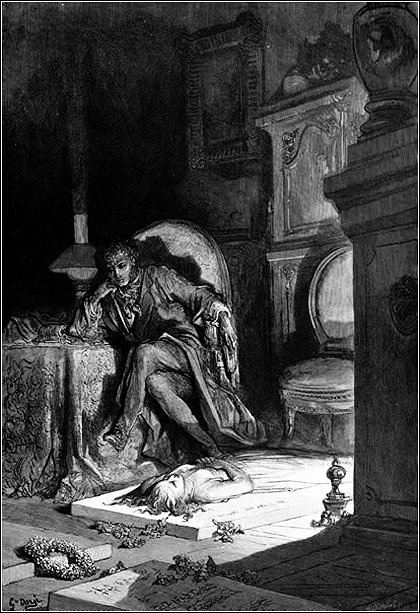
LENORE
Ah, broken is the golden bowl! the spirit flown forever!
Let the bell toll!–a saintly soul floats on the Stygian river.
And, Guy de Vere, hast thou no tear?–weep now or never more!
See! on yon drear and rigid bier low lies thy love, Lenore!
Come! let the burial rite be read–the funeral song be sung!–
An anthem for the queenliest dead that ever died so young–
A dirge for her, the doubly dead in that she died so young.
"Wretches! ye loved her for her wealth and hated her for her pride,
And when she fell in feeble health, ye blessed her–that she died!
How shall the ritual, then, be read?–the requiem how be sung
By you–by yours, the evil eye,–by yours, the slanderous tongue
That did to death the innocence that died, and died so young?"
Peccavimus; but rave not thus! and let a Sabbath song
Go up to God so solemnly the dead may feel no wrong!
The sweet Lenore hath "gone before," with Hope, that flew beside,
Leaving thee wild for the dear child that should have been thy bride–
For her, the fair and debonnaire, that now so lowly lies,
The life upon her yellow hair but not within her eyes–
The life still there, upon her hair–the death upon her eyes.
"Avaunt! to-night my heart is light. No dirge will I upraise,
But waft the angel on her flight with a paean of old days!
Let no bell toll!–lest her sweet soul, amid its hallowed mirth,
Should catch the note, as it doth float up from the damned Earth.
To friends above, from fiends below, the indignant ghost is riven–
From Hell unto a high estate far up within the Heaven–
From grief and groan to a golden throne beside the King of Heaven."
1844
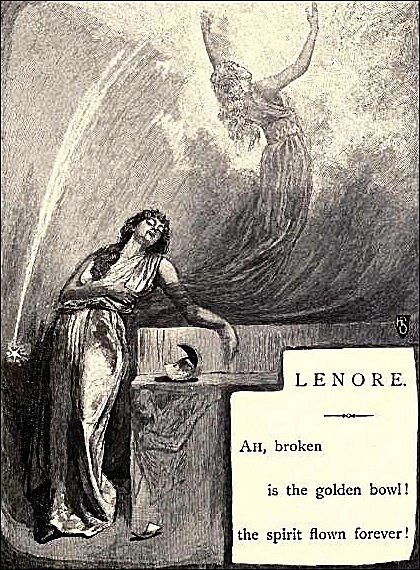

.jpg)
kemp=mag poetry magazine
More in: Edgar Allan Poe, Poe, Edgar Allan
Thank you for reading Fleurs du Mal - magazine for art & literature